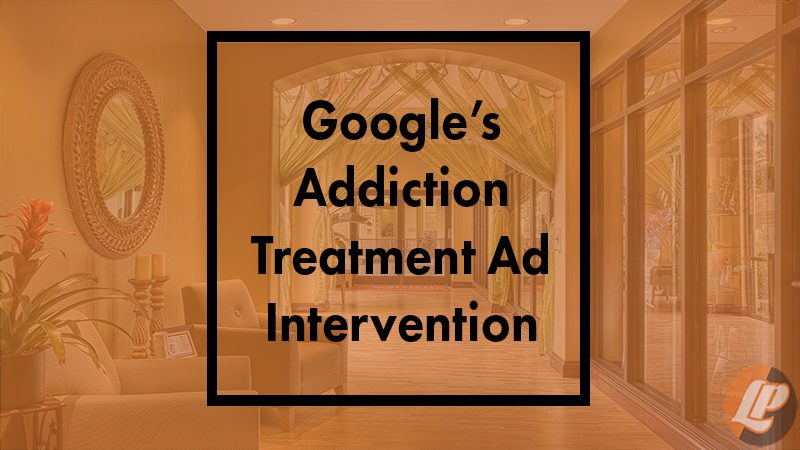Google’s Addiction Treatment Intervention
As an industry, addiction treatment centers have admitted they were powerless over predatory digital marketing practices – then a higher power implemented an intervention to help restore sanity. Google has recently stepped in and restricted ads for queries about addiction treatment and addiction recovery resources.
The problem
As the reputable providers of addiction treatment are painfully aware, there’s a ton of online competition for traffic (both paid and organic). Searches included advertisements and results littered with 800-numbers designed to generate leads from third-party call centers.
It’s a multi-pronged problem with charlatans preying on the folks that are seeking help. High-pressure sales tactics, deceptive tactics, over-billed insurance, and steering from “neutral third-party” referrers to specific (a possible disreputable or dishonest) treatment centers. This is on top of the fly-by-night “treatment centers” that have set up shop to cash in.¹
Google’s Solution
Reading the fine print on Google’s nonprofit grant program, you’ll see that you’re limited to bidding on words with a cost-per-click (CPC) of less than $2. That’s a non-start for the words that matter in an industry of scammers. They don’t think anything about paying $70 per click when their insurance payoff could be around $10,000.
So, Google has rolled out an ad ban for a growing list of words related to addiction treatment. This ban affects both reputable as well as shady digital marketers. There’s not currently a great way to screen the distinction at the moment. This isn’t the first time Google has taken steps like this to protect consumers.² They’ve affected change to limit ads for payday lenders and created a verification system for locksmiths.
What’s next?
While this ban has been called temporary, there’s no actionable forecast for when ads will be available, or what safeguards will be in place to keep the predatory advertisers away. If you received a Google Grant for AdWords, don’t despair, Google hasn’t banned every word. Take a look at what’s in your price range, and makes sense. Just like before the ban, temper your expectations with reality.
If you’ve had a budget outside of a grant, this might be a great time to reallocate your budget of time and funds toward efforts that help you organically. If you’re creating helpful content, Google is more likely to reward you with organic search rankings.
Now more than ever, you should be actively working on blogs, videos, and other content. The beauty of ranking organically is that it doesn’t cost you in PPC dollars every month. While you might not find yourself permanently on page one, these organic clicks have staying-power to offset your PPC budget.
Help is available to make sure that your content is optimized for the terms that your prospective addiction treatment patients are searching. No matter which words get banned next, or when ads come back, you should be performing search engine optimization (SEO) as part of your overall addiction treatment marketing strategy.
References:
¹ The Verge has had a particularly good focus on this topic. See their take on the problems of the addiction treatment industry online and their coverage of Google’s rehab ad ban.
² New York Times Coverage of Google’s limits on addiction treatment center ads
